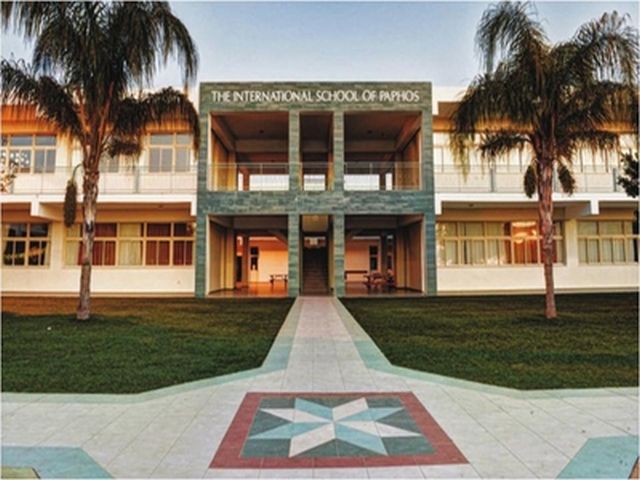Education in Romania
Education in Romania is based on a tuition-free, egalitarian system. Access to free education is guaranteed by Article 32 in the Constitution of Romania. Education is regulated and enforced by the Ministry of National Education. Each step has its own form of organization and is subject to different laws and directives. Kindergarten is optional under the age of six. Compulsory schooling usually starts at age 6, with the „preparatory class”, which is mandatory in order to enter the first grade. Schooling is compulsory until the tenth grade (which corresponds with the age of sixteen or seventeen). The school educational cycle ends in the twelfth grade, when students graduate the baccalaureate. Higher education is aligned onto the European Higher Education Area. In addition to the formal system of education, to which was recently added the equivalent private system, there is also a system of tutoring, semi-legal and informal. School starts in the middle of September and ends in the middle of June the following year. It is divided into two semesters (September to December and January to June). There are four holiday seasons: autumn (an additional free week in November for pupils in primary classes); winter (3 or 2 weeks, depending on the annual curriculum, in December-January); spring (in April, 2 weeks); summer (spanning from the middle of June to September 15). Additionally, during the week before the spring holiday, special activities (e.g. trips, contests) replace classes. This week is known as „The Otherwise Week”. A class can have up to 30 pupils (25 is considered optimum). At the end of the 8th year of school (at age 14 or 15) a nationwide test is taken by all pupils called „The National Evaluation” and can be taken only once, in June. The subjects are Romanian Language and Literature and Mathematics (and additionally the mother language for ethnic minority schools or the foreign language for bi-lingual schools). Many high schools provide classes with intensive study of a foreign language, such as English, French, German or Spanish. A national computer system does the repartition. High school graduating pupils must take the National Baccalaureate Exam. The Bacalaureat comprises 2 or 3 oral examinations and 4 or 5 written examinations, usually spanning on the course of one and a half weeks in late June or in September. It is a highly centralized, national exam. Usually the exam papers are taken to another city. The exam supervisors cannot teach in that high school. The Romanian universities were considered among the best in Eastern Europe and attracted international students, especially in the fields of medicine and technology. Romania also has a private system of higher education, with private universities operating in the larger cities. According to the prestigious QS World University Rankings, in 2012, four Romanian universities were included in the Top 700 universities of the world: Alexandru Ioan Cuza University, Babeș-Bolyai University, University of Bucharest and West University of Timişoara.
Penelopa Stanca, teacher, "Constantin Noica" Theoretical High School Sibiu
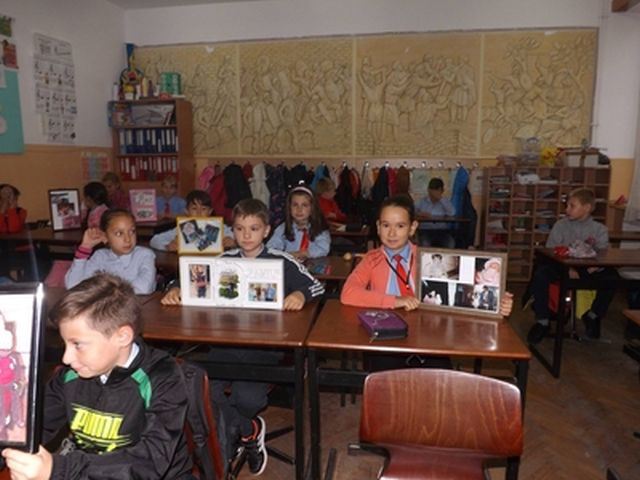
Educația în România
Educația în România se bazează pe un sistem de învățământ gratuit, egalitar. Accesul liber la educație este garantat de Articolul 32 din Constituția României. Educația este reglementată și pusă în aplicare de către Ministerul Educației Naționale. Fiecare etapă are propria sa formă de organizare și este supusă unor legi diferite și directive. Grădinița este opțională sub vârsta de șase ani. Școlarizarea obligatorie începe, de obicei, la varsta de 6 ani, cu „clasa pregătitoare”, care este obligatorie pentru a putea intra în clasa întâi. Școlarizarea este obligatorie până în clasa a zecea (care corespunde cu vârsta de șaisprezece sau șaptesprezece ani). Ciclul de învățământ școlar se termină în clasa a douăsprezecea, atunci când elevii absolvă bacalaureatul. Învățământul superior este aliniat la Spațiul European al Învățământului Superior. În plus față de sistemul formal de educație, la care s-a adăugat recent sistemul privat echivalent, există, de asemenea, un sistem de îndrumare, semi-legal și informal. Școala începe la mijlocul lunii septembrie și se termină la mijlocul lunii iunie anul următor. Acesta este împărțit în două semestre (septembrie până în decembrie și ianuarie iunie). Există patru anotimpuri de vacanță: toamnă (o săptămână liberă suplimentară în luna noiembrie pentru elevii din clasele primare); iarnă (3 sau 2 săptămâni, în funcție de curriculum-ul anual, în decembrie-ianuarie); primăvară (în aprilie, 2 săptămâni); vara (întinzăndu-se de la mijlocul lunii iunie până la 15 septembrie). În plus, în timpul săptămânii dinainte de vacanța de primăvară, activități speciale (ex. excursii, concursuri) înlocuiesc orele de curs. Această săptămână este cunoscut sub numele de Săptămâna Altfel. O clasă poate avea până la 30 de elevi (25 este considerat optim). La sfârșitul celui de-al 8-lea an școlar (la vârsta de 14 sau 15 ani), se dă un test la nivel național de către toți elevii, numit "Evaluarea Națională" și poate fi luat doar o singură dată, în luna iunie. Disciplinele școlare sunt limba și literatura română și matematică (și, în plus, limba maternă pentru școlile minorităților etnice limba străină pentru școli bilingve). Multe licee oferă clase cu program de studiu intensiv al unei limbi străine, cum ar fi limba engleză, franceză, germană sau spaniolă. Un sistem informatic național face repartizarea. Elevii ce au absolvit liceul trebuie să ia examenul național de Bacalaureat. Bacalaureatul cuprinde 2 sau 3 examene orale și 4 sau 5 examene scrise, de obicei, în curs de una sau două săptămâni și jumătate la sfârșitul lunii iunie sau în septembrie. Este un examen foarte centralizat, la nivel național. De obicei, documentele de examen sunt luate într-un alt oraș. Supraveghetorii examenului sunt profesori ce nu predau în acel liceu. Universitățile din România au fost considerate printre cele mai bune din Europa de Est și au atras studenți internaționali, mai ales în domeniul medicinei și al tehnologiei. România are, de asemenea, un sistem privat de învățământ superior, cu universități private care funcționează în orașele mari. În conformitate cu prestigiosul QS World University Rankings, în 2012, patru universități din România au fost incluse în top 700 de universități din lume: Universitatea Alexandru Ioan Cuza, Universitatea Babeș-Bolyai, Universitatea din București și Universitatea de Vest din Timișoara.
Emilia Dragomir, profesor, Liceul Teoretic "Constantin Noica" Sibiu
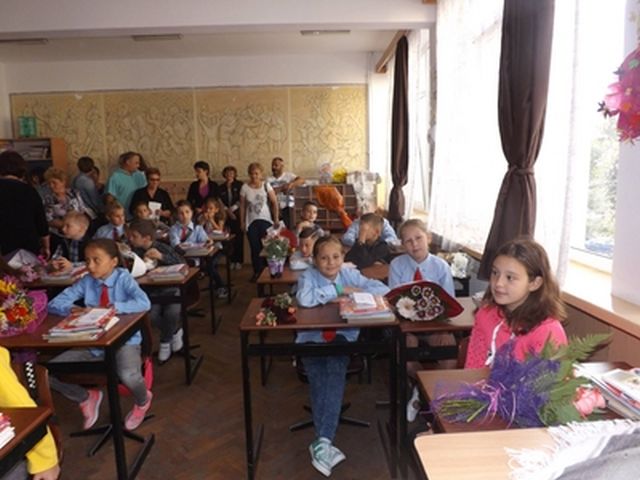
TURKISH EDUCATION SYSTEM
Turkish education system is under the supervision and control of the state, namely the Ministry of National Education. According to the Constitution of the Republic of Turkey, everyone has the right to receive education. Education is compulsory from ages 6 to 14 and free in state schools. The country's primary schools currently have a 98 percent participation rate. The academic year in Turkish education institutions generally begins in the mid-September or early October and continues to May or early June. There is also a two-week winter break in February. Stages of the Education System: Pre-School Education: Optional kindergarten education, up to 6 years of age. Primary Education: Compulsory and free basic education for eight years (5 years elementary + 3 years secondary), 6-14 years of age. Secondary Education: 4 years of High School (Lise), or Vocational High School education, 15-17/18 years of age. Some schools might have an additional year of language study. High schools are mostly owned by the government and provide free education. Higher Education: 4 years of University, or 2 years at Higher Vocational Schools. Some schools have an additional year of language study. Under normal circumstances, Master's study lasts 2 years; PhD 3-5 years. This category includes all educational institutions which will provide post-secondary education. They are under the supervision of Higher Educational Council (YOK). Types of High Schools: Public High Schools (“Normal Liseler” or “Duz Liseler”): Any student who successfully completes 8 years of basic education can go onto these schools. Graduates of public high schools, if successful in the nationwide University Entrance Examination (ÖSS), can go onto higher education institutions. Graduates are awarded with the Lise Diploması. Vocational High Schools (Meslek Liseleri): Some of these schools may take an additional year to complete. Graduates can automatically go on to higher vocational schools (Meslek Yüksek Okulları - 2 Year Vocational Colleges) in their respective fields of study if they wish. Alternatively, if successful in the university entrance examination, they can go onto 4-year schools in their respective fields. Anatolian High Schools (Anadolu Liseleri): One year of English study followed by 3 years of regular high school education, additional hours for English. Math and Science lessons at these schools are sometimes taught in English. Lessons at some Anatolian high schools are taught in either German or French. Super High Schools (Super Liseler): The difference between these and normal high schools is one extra year of English study. They differ from Anatolian high schools in that the language of instruction for math and science courses is always Turkish and less hours are given to English lessons. Science High Schools (Fen Liseleri): These are special public schools for students who have exceptional aptitude in the sciences. These very competitive high schools train students specifically for higher education in the sciences, technical and medical fields. There is also Anatolian Science High Schools (Anadolu Fen Liseleri), where the medium of instruction for math and sciences is sometimes in English. Private High Schools (Ozel Liseler): Most private high schools charge very high tuition fees and are very competitive. Types of Higher Education Institutions: State Universities (Devlet Universiteleri): The university system in Turkey is governed by the Higher Educational Council (YOK). Turkey has 104 state and 62 private universities (a total of 166 institutions of higher learning), 5 of which are located in the Turkish Republic of Northern Cyprus. Apart from the public and private universities, 8 foundation higher vocational schools serve the job market. Generally, undergraduate education takes 4 years at universities, but some fields such as medicine (6 years), dentistry (5 years), and veterinary science (5 years) take longer. Turkish high school graduates go directly into fields of study such as medicine, law, dentistry and so on. No tuition fee is charged at public schools (devlet universitesi); students pay only a small basic fee. Students need to pass a nationwide University Entrance Exam (OSS) to enter a university. The graduates of 4-year programs are awarded with the Bachelor’s Degree (Lisans Diplomasi). The medium of instruction at some state universities is English, German or French. Therefore, all correspondence with the university staff and applications to the faculties can be done in English, German or French. However, instruction language at state universities is mostly Turkish. When entering the exam of the university, the knowledge of Turkish is not necessary. Those who pass the exams, and have only a little knowledge of Turkish, are considered to take one year of language foundation to gain proficiency in the Turkish language. Graduate-level programs consist of master and doctoral programs, coordinated by institutes in universities. Medical specialty programs are carried out within the faculties of medicine and the training hospitals owned by the Ministry of Health and the Social Security Institute (SGK). Higher Vocational Schools (Meslek Yuksek Okulları): They offer 2 years of undergraduate study after high school and are very much like the community colleges in the USA. The only difference is that students cannot easily transfer to 4-year schools in the USA due to fewer places at the 4-year schools. Two year graduates must take the national Vertical Transfer Test (Dikey Gecis Sinavi) and have a high GPA to be able to apply to 4-year schools. The graduates of 2-year programs are awarded with the Associate’s or Pre-Bachelor’s Degree (On Lisans Diplomasi). Private or Foundation Universities (Ozel / Vakif Universiteleri): In Turkey, private foundations obtained the right in 1984 to establish and develop universities. They were established with the fundamental aim of creating a centre of excellence in higher education and research. Private universities take more active initiatives to form and to select international and global educational and research networks. The medium of instruction in most private universities is English. Almost all have one year of English study for those whose level of English is not found to be proficient upon entrance.
Müberra Durak, teacher, Vali Mehmet Lutfullah Bilgin Ortaokulu
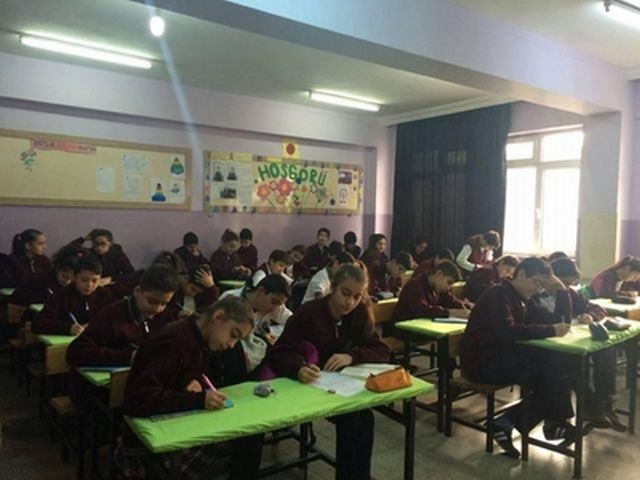
TÜRK EĞİTİM SİSTEMİ
Türk eğitim sistemi, Millî Eğitim Bakanlığı vasıtasıyla devletin gözetim ve denetimi altındadır. Türkiye Cumhuriyeti Anayasasına göre, herkes eğitim görme hakkına sahiptir. Eğitim 6 ila 14 yaşları arasında zorunlu olup devlet okullarında ücretsizdir. Ülkede ilkokullara başlama ve devam etme oranı %98’dir. Türk eğitim kurumlarında akademik yıl genellikle Eylül ayı ortalarında veya Ekim ayı başlarında başlar ve Mayıs sonu veya Haziran başına kadar devam eder. Ayrıca, Şubat ayında iki haftalık bir kış tatili mevcuttur. Eğitim Sisteminin Evreleri - Okul Öncesi Eğitim: İsteğe bağlı anaokulu eğitimi, 6 yaşa kadar. İlköğretim: 8 yılık zorunlu ve ücretsiz temel eğitim (4 yıl ilkokul + 4 yıl ortaokul), 6-14 yaş. Orta Öğrenim: 4 yıllık Yüksek Okul (Lise) veya Meslek lisesi eğitimi, 15-17/18 yaşları arası. Bazı okullarda bir yıllık hazırlık sınıfı (dil eğitimi) olabilir. Liselerin çoğu devlete ait olup ücretsiz eğitim vermektedir. Yüksek Öğrenim: 2 yıllık Meslek Yüksek Okulları veya 4 yıllık üniversiteler. Bazı okullarda bir yıllık dil eğitimi vardır. Normal şartlar altında, yüksek lisans çalışması 2 yıl; doktora 3-5 yıl sürer. Bu kategori, lise sonrası eğitim verecek tüm eğitim kurumlarını içerir. (YÖK) Yüksek Öğretim Kurulu gözetimi altındadır. Lise Türleri - Devlet Liseleri: 8 yıllık temel eğitimini başarıyla tamamlayan her öğrenci bu okullara gidebilir. Lise mezunları, ülke çapındaki üniversite sınavında başarılı oldukları takdirde yüksek öğretim kurumlarına kayıt yaptırabilirler. Mezunlar lise diploması almaya hak kazanırlar. (Meslek Liseleri) Meslek Yüksek Okulları: Bu okulların bazıları normal liselerden bir yıl fazla eğitimi vermektedir. Mezunlar, isterlerse otomatik olarak çalışma alanlarında (Meslek Yüksek Okulları- 2 Yıllık Meslek Yüksekokulu) Meslek Yüksek Okullarına devam edebilir. Alternatif olarak, üniversite giriş sınavında başarılı olurlarsa, kendi alanlarında 4 yıllık okullara gidebilirler. Anadolu Liseleri: Bir yıllık İngilizce eğitiminin ardından normal lise eğitimi devam eder. Bu okullarda Matematik ve Fen dersleri bazen İngilizce olarak öğretilir. Bazı Anadolu Liselerinde dersler Almanca veya Fransızca öğretilir. Süper Liseler: Normal Liseler ve Süper Liseler arasındaki fark fazladan bir yıl İngilizce eğitimi verilmesidir. Anadolu Liselerinden farkı, Matematik ve Fen dersleri için eğitim dilinin her zaman Türkçe olması ve İngilizce derslerine daha az zaman ayrılmasıdır. Fen Liseleri: Bu okullar, bilim alanında kabiliyeti olan öğrenciler içindir. Bu çok rekabetçi okullar, öğrencileri özellikle bu çok rekabetçi yüksek okul öğrencileri, özellikle bilim, teknik ve tıp alanlarında yüksek öğrenim almaları için hazırlar. Ayrıca, Matematik ve Fen derslerinin İngilizce öğretildiği Anadolu Fen Liseleri de mevcuttur. Özel Lise: Birçok özel lise yüksek fiyatlar talep edip rekabetçi eğitim ortamları sunmaktadır. Yüksek Öğrenim Kurumları Tipleri - Devlet Üniversiteleri: Türkiye'de üniversite sistemi (YÖK) Yüksek Öğretim Kurulu tarafından yönetilir. Türkiye’de, Kuzey Kıbrıs Türk Cumhuriyeti'nde bulunan 5 üniversiteyi de dahil ettiğimizde 104 devlet üniversitesi ve 62 özel üniversite mevcuttur., Bunların dışında, 8 Vakıf Meslek Yüksekokulu iş piyasasına hizmet vermektedir. - Genellikle, lisans eğitimi üniversitelerde 4 yıl sürer, ama tıp (6 yıl) diş hekimliği (5 yıl), ve veterinerlik bilimi (5) gibi bölümler daha uzundur. Lise mezunları doğrudan Tıp, Hukuk, Diş hekimliği gibi çalışma alanlarına girebilirler. Devlet Üniversitelerinde hiçbir eğitim ücreti alınmaz; öğrenciler sadece temel bir harç öderler. Öğrencilerin üniversiteye girmek için ulusal üniversite giriş sınavını geçmeleri gerekir. 4 yıllık öğretim programından sonra, lisans diploması ile mezun olurlar. Bazı devlet üniversitelerinde eğitim dili İngilizce, Almanca ya da Fransızcadır. Bu nedenle, fakülte, üniversite personeli ile tüm yazışmalar ve başvurular İngilizce, Almanca veya Fransızca yapılabilir. Ancak, devlet üniversitelerinde öğretim dili çoğunlukla Türkçedir. Üniversite sınavına girerken, Türkçe bilgisi gerekli değildir. Sınavları kazanan ve Türkçe bilgisi yeterli olmayan öğrenciler Türkçe yeterliliklerini geliştirmeleri için bir yıllık dil kursuna alınırlar. Yüksek lisans ve doktora programları gibi lisansüstü eğitim programları, üniversitelerde enstitüler tarafından koordine edilir. Tıpta uzmanlık programları, tıp fakülteleri ve Sağlık ve Sosyal Güvenlik Kurumu Bakanlığı'na ait eğitim hastaneleri bünyesinde yürütülmektedir. Meslek Yüksek Okulları: Liseden sonra, 2 yıllık ön lisans eğitimi sunarlar ve ABD'de bulunan kolejler gibidirler. Tek fark, Amerika’daki kolejlerde öğrencilerin 4 yıllık okullara kolay geçemiyor olmalarıdır. İki yıllık mezunlar, not ortalamaları uygun olduğu takdirde Dikey Geçiş Sınavı ile 4 yıllık okullara başvuru yapabilmektedir. 2 yıllık programlardan mezun olanlar ön lisans diploması almaya hak kazanırlar. Özel veya Vakıf Üniversiteleri: Türkiye'de özel vakıflar üniversite kurmak ve geliştirmek hakkını 1984 yılında hakkı elde etmiştir. Bunlar, yüksek öğretim ve araştırma alanında bir mükemmeliyet merkezi oluşturma temel amacı ile kurulmuştur. Birçok özel üniversitede eğitim dili İngilizcedir. Seviye tespit sınavlarında, İngilizce bilgisi yeterli bulunmayan bireyler bir yıllık hazırlık sınıfına alınırlar.
Fatma Karadoğan, öğretmen, Vali Mehmet Lutfullah Bilgin Ortaokulu
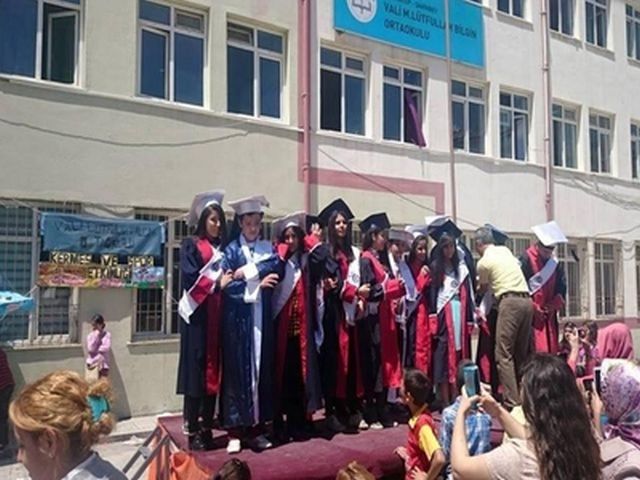
Education System in Lithuania
In Lithuania, general education is divided into the following stages: primary, basic, secondary. Primary education is compulsory. It lasts for 4 years (ages 6/7 to 10/11). The purpose of primary education programme is the development of a healthy, active, and creative child who has acquired elementary literacy, social, informational and cognitive skills, which are necessary for proceeding to basic (lower secondary) education. The programme consists of the following subjects: moral education (religion or ethics), languages (mother tongue and first foreign language), mathematics, perception of the world, arts (drawing, music, dance, and theatre), and physical education. Schools may also choose to offer non-traditional curricula based on Montessori, Waldorf, Suzuki. Pupil assessment may take any form, depending on the teacher, such as notes, reviews, and descriptions. However, no grades are given at this stage. Basic (lower secondary) education is compulsory. It lasts for 6 years (ages 10/11 to 16/17). The purpose of basic education program is to provide an individual with the basics of moral, socio-cultural and civic maturity, general literacy and the basics oftechnological literacy, to cultivate national consciousness, to foster an intent and ability to make decisions and choices and to continue learning. The programme consists of two cycles: 5th – 8th and 9th – 10th grades. The purpose of first cycle is to integrate the basics of knowledge, abilities and skills. The second cycle is oriented to education of abstract thinking; the knowledge obtained at the latter is more generalized. The program consists of the following subjects: moral education (religion or ethics), languages (mother tongue, first and second foreign languages), mathematics, natural sciences, social education (history, geography, civil education, economics and enterprise, psychology), arts (drawing, music, dance, theatre, and modern arts), information technologies, technologies, physical education. Some subjects could be studied at an intensified level. At this stage, assessment is criterion-referenced. A 1 to 10 marking system is used with 10 as the highest mark and 4 as the lowest passing mark. Secondary education is made available to everybody who has successfully completed basic (lower secondary) education. It lasts for 2 years (ages 17/18 to 18/19). The purpose of secondary education is to assist a person in the acquisition of general academic, socio-cultural and technological literacy, moral, national and civic maturity. The core of the secondary program consists of the following subjects: moral education (religion or ethics), languages (mother tongue and foreign languages), mathematics, social education (history, geography, or an integrated social sciences course), natural sciences (biology, physics, chemistry, or an integrated natural sciences course), arts (drawing, music, dance, theatre, or modern arts), information technologies,technologies, and physical education. The choice of subjects for each pupil is based on individuality and differentiation. After pupils complete secondary education curriculum, they have to take leaving examinations, which are of two types: state-level and school-level. School-level examinations are held and assessed at school, while state-level examinations are held and assessed at National Examination Centres. Up until 2010, all state-level examinations had an equivalent examination at school-level. From 2010, the following examinations are offered. All pupils have to take an obligatory examination in the Lithuanian language, which consists of two parts, and 1 elective examination. Previously more examinations were required.
Oresta Arbasauskaite, pupil, President Valdas Adamkus gymnasium Kaunas
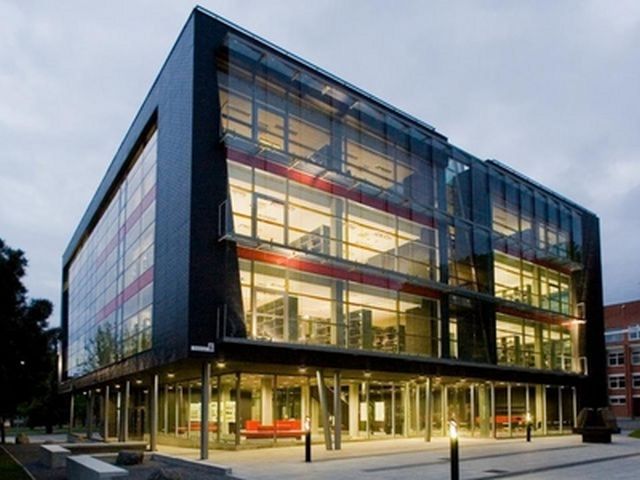
Lietuvos Švietimo Sistema
Lietuvoje bendrojo ugdymo sistema skirstoma į šias pakopas: pradinis, pagrindinis, vidurinis. Pradinis ugdymas yra privalomas. Jis trunka ketverius metus (nuo 6-7 metų iki 10-11 metų). Pradinio ugdymo tikslas – ugdyti sveiką, aktyvų, kūrybingą, elementaraus raštingumo ir socialinių, pažintinių, informacinių gebėjimų pamatus įgijusį vaiką, pasirengusį mokytis toliau pagal pagrindinio ugdymo programas. Pradinio ugdymo programą sudaro šios sritys: dorinis ugdymas (tikyba arba etika), kalbinis ugdymas (gimtoji kalba ir pirmoji užsienio kalba), matematika, pasaulio pažinimas, meninis ugdymas (dailė, muzika, šokis ir teatras) ir kūno kultūra. Mokykla taip pat gali siūlyti pasirinkti netradicinę ugdymo programą, paremtą Montesori, Waldorfo, Suzuki pedagogine samprata. Mokinių pasiekimų vertinimui naudojami komentarai, aprašymai, vertinimo aplankai. Mokinių pasiekimai pažymiais nevertinami. Pagrindinis ugdymas yra privalomas. Jis trunka šešerius metus ( nuo 10-11 metų iki 16-17 metų). Pagrindinio ugdymo tikslas yra suteikti asmeniui moralinius, sociokultūrinius ir pilietinio brandumo pagrindus, bendrojo raštingumo ir technologinio raštingumo pagrindus, puoselėti pilietiškumą bei skatinti ryžtingumą ir gebėjimą priimti sprendimus dėl tolimesnio mokymosi. Programa sudaryta iš dviejų pakopų: 5-8 klasės ir 9-10 klasės. Pirmoji ugdymo pakopa yra orientuota į bazines žinias ir gebėjimus. Antrojoje pakopoje ugdomas abstraktusis mąstymas ir apibendrinamos žinios, įgytos pirmojoje pakopoje. Pagrindinio ugdymo programą sudaro šios sritys: dorinis ugdymas (tikyba arba etika), kalbinis ugdymas (gimtoji kalba ir pirmoji ir antroji užsienio kalbos), matematika, gamtos mokslai, socialinis ugdymas (istorija, geografija, pilietiškumo ugdymas, ekonomika ir verslumas, psichologija), meninis ugdymas (dailė, muzika, šokis, teatras arba šiuolaikiniai menai), informacinės technologijos, technologijos ir kūno kultūra. Kai kurių mokomųjų dalykų galima mokytis sustiprintu lygiu. Šioje pakopoje mokinių pasiekimai vertinami pažymiais nuo 1 iki 10. 10 yra aukščiausias įvertinimas, 4 – žemiausias teigiamas įvertinimas. Vidurinis ugdymas yra prieinamas visiems, sėkmingai baigusiems pagrindinio ugdymo programą. Jis trunka du metus (nuo 17-18 metų iki 18-19 metų). Vidurinio ugdymo tikslas yra suteikti galimybę mokiniui įgyti akademinį, sociokultūrinį ir technologinį raštingumą bei moralinę, tautinę ir pilietinę brandą. Vidurinio ugdymo pagrindą sudaro šios sritys: dorinis ugdymas (tikyba arba etika), kalbinis ugdymas (gimtoji kalba ir užsienio kalbos), matematika, socialinis ugdymas (istorija, geografija arba integruotų socialinių mokslų), gamtos mokslai (biologija, fizika, chemija arba integruotų gamtos mokslų kursas), meninis ugdymas (dailė, muzika, šokis, teatras arba šiuolaikiniai menai), informacinės technologijos, technologijos ir kūno kultūra. Mokomuosius dalykus mokinys gali rinktis pagal savo poreikius ir gebėjimus. Baigę vidurinio ugdymo programą, mokiniai privalo laikyti baigiamuosius egzaminus, kurie skirstomi į dvi grupes: valstybiniai egzaminai arba mokykliniai egzaminai. Mokykliniai egzaminai yra laikomi ir vertinami mokykloje, tuo tarpu valstybiniai egzaminai – Nacionaliniame egzaminų centre. Iki 2010 metų visus mokomuosius dalykus buvo galima laikyti arba valstybiniu, arba mokykliniu lygiu. Nuo 2010 metų siūlomi šie egzaminai. Mokiniai privalo laikyti lietuvių kalbos egzaminą, kuris susideda iš dviejų dalių ir vieną pasirenkamąjį egzaminą. Seniau buvo privaloma laikyti daugiau egzaminų.
Steponas Mikalauskas, mokinys, President Valdas Adamkus gymnasium Kaunas
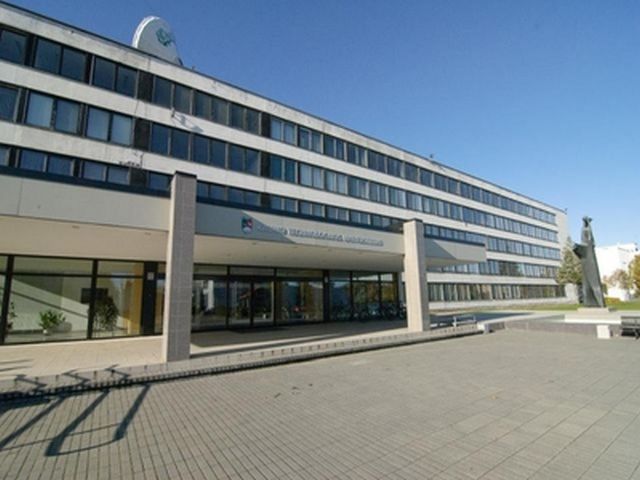
The Education System of Cyprus
Pre-Primary Education is compulsory for all children between 4 8/12 – 5 8/12 years old. Children are also accepted over the age of 3. This level of education aims to satisfy the children’s needs for the development of a wholesome personality in an experiential environment which enables them to recognize their capabilities and enhance their self-image. Primary education is compulsory for all children over the age of 5 8/12 and has a duration of 6 years. The aim of Primary Education is to create and secure the necessary learning opportunities for children regardless of age, sex, family and social background and mental abilities. Secondary General Education offers two three-year cycles of education – Gymnasio (lower secondary education) and Lykeio (upper secondary education) – to pupils between the ages of 12 and 18. The curriculum includes core lessons, interdisciplinary subjects and a variety of extracurricular activities. Instead of the Lykeio, pupils may choose to attend Secondary Technical and Vocational Education which provides them with knowledge and skills which will prepare them to enter the workforce or pursue further studies in their area of interest. Post-Secondary Vocational Education and Training offers all types of vocational education and training and provides students with the necessary qualifications by imparting academic and technical knowledge, as well as professional and practical skills. The duration of the programmes offered is two years, on a 5-day basis. At present, public and private universities operate in Cyprus. The public universities are: 1. The University of Cyprus; 2. The Cyprus University of Technology; 3. The Open University of Cyprus. The private universities are: 1. European University; 2. Frederick University; 3. University of Nicosia; 4. Neapolis University of Pafos; 5. University of Central Lancashire. Higher education in Cyprus is also provided by a number of State Higher Education Institutions, and an even greater number of Private Institutions of Higher Education, none of which has university status. The State Institutions of Higher Education, offer vocational programmes of study with a duration ranging from one to three academic years. These programmes do not provide access to second cycle programmes. The apolyterion or equivalent qualification, is a prerequisite for access to the programmes offered by State Higher Education Institutions and candidates for entrance to a particular programme are ranked according to their performance in the Pancyprian Examinations. Currently, 40 Private Institutions of Higher Education are registered with the Ministry of Education and Culture. Private Institutions of Higher Education do not have university status but they offer both academic and vocational programmes of study at the undergraduate and postgraduate levels. The competent body for quality assurance and accreditation of the programmes offered by Private Institutions of Higher Education is the Council for Educational Evaluation - Accreditation (Symvoulio Ekpedeftikis Axiologisis Pistopiisis, SEKAP), which is a member of ENQA. At present, a number of programmes offered by the Private Institutions, have been evaluated and accredited by SEKAP. These programmes fall into the following categories: Academic and Vocational programmes of study lead to the following qualifications: Certificate (1 year), Diploma (2 years) and Higher Diploma (3 years). For access to these programmes the apolyterion or equivalent qualification is a prerequisite. First cycle programmes (4 years), lead to the award of a Bachelor Degree. For access to these programmes the apolyterion or equivalent qualification is a prerequisite. Second cycle programmes (1 to 2 years) lead to the award of a Masters Degree. The prerequisite for access to these programmes is the Ptychio, or Bachelor, or equivalent qualification. The competent national body for the recognition of higher education qualifications is the Cyprus Council for the Recognition of Degrees (Kypriako Symvoulio Anagnorisis Titlon Spoudon, KYSATS). KYSATS recognizes equivalence, or equivalence - correspondence for first cycle titles, or just equivalence for postgraduate titles (second or third cycle). KYSATS may also recognize joint degrees. The establishment of a Quality Assurance Agency has been approved by the Council of Ministers of the Republic of Cyprus. The aim of this Agency is to promote quality assurance in both the public and the private institutions of higher education, through various measures which include external accreditation and development of internal quality culture. These efforts are in line with the Berlin Communique, the ENQA Standards and Guidelines on QA, as accepted by the Bergen Communique and the Agreement on Quality Assurance in the EU.
Zoe Eliadou, pupil, Gymnasium Apostolou Paulou in Paphos
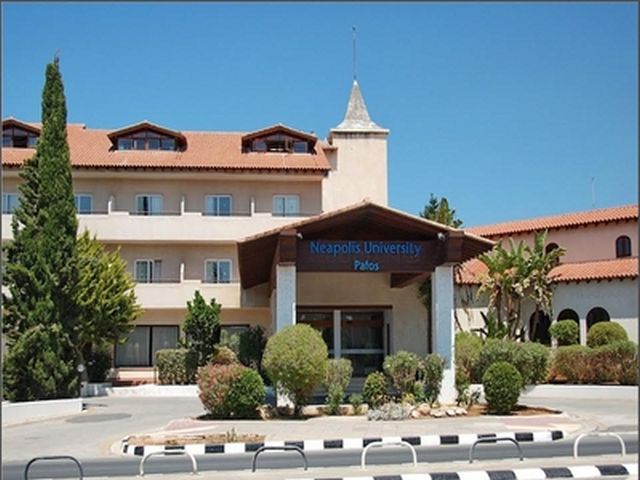
To Ekpaideftikó Sýstima tis Kýpros
I proscholikí ekpaídefsi eínai ypochreotikí gia óla ta paidiá metaxý 4 8/12 - 5 8/12 chronón. Ta paidiá gínontai epísis apodektés páno apó tin ilikía ton 3. Aftó to epípedo tis ekpaídefsis échei os stócho na ikanopoiísei tis anánkes ton paidión gia tin anáptyxi enós ygieinó prosopikótitas se éna empeirikó perivállon pou tous epitrépei na anagnorísoun tis dynatótités tous kai na enischýsoun tous afto-eikóna. I protováthmia ekpaídefsi eínai ypochreotikí gia óla ta paidiá ilikías áno ton 5 8/12 kai échei diárkeia 6 etón. O skopós tis Protováthmias Ekpaídefsis eínai na dimiourgísei kai na diasfalísei tis anankaíes ekpaideftikés efkairíes gia ta paidiá, anexártita apó tin ilikía, to fýlo, to oikogeneiakó kai koinonikó ypóvathro kai pnevmatikés ikanótites. Defterováthmia Genikí Ekpaídefsi prosférei dýo kýklous diárkeias trión etón me tin ekpaídefsi - Gymnásio (katóteri defterováthmia ekpaídefsi) kai to Lýkeio (anóteri defterováthmia ekpaídefsi) - se mathités metaxý ton ilikión 12 kai 18. To prógramma spoudón perilamvánei mathímata, diepistimoniká thémata kai mia poikilía ton exoscholikón drastiriotíton. Antí tou Lykeíou, oi mathités boroún na epiléxoun na parakolouthísoun Mésis Technikís kai Epangelmatikís Ekpaídefsis, pou tous paréchei tis gnóseis kai tis dexiótites pou tha tous proetoimásei gia na eisélthoun sto ergatikó dynamikó í na synechísoun tis spoudés tous stin periochí pou tous endiaférei. Meta-Defterováthmia Epangelmatikí Ekpaídefsi kai Katártisi prosférei óla ta eídi tis epangelmatikís ekpaídefsis kai katártisis kai paréchei stous foitités ta aparaítita efódia apó akadimaïkés kai technikés gnóseis, kathós kai epangelmatikés kai praktikés dexiótites. I diárkeia ton programmáton pou prosférontai eínai dýo chrónia, me vási 5 imerón. Epí tou paróntos, ta dimósia kai idiotiká panepistímia leitourgoún se Kýpros. Ta dimósia panepistímia eínai ta exís: 1. To Panepistímio Kýpros? 2. I Kýpros Technologikó Panepistímio? 3. To Anoiktó Panepistímio Kýpros. Ta idiotiká panepistímia eínai ta exís: 1. Evropaïkó Panepistímio? 2. Panepistímio Frederick? 3. Panepistímio Lefkosías? 4. Panepistímio Neápolis Páfou? 5. University of Central Lancashire. Tritováthmias ekpaídefsis stin Kýpros paréchetai epísis apó mia seirá Kratiká Idrýmata Tritováthmias Ekpaídefsis, kai énan akómi megalýtero arithmó ton Idiotikón Scholón Tritováthmias Ekpaídefsis, kamía apó tis opoíes den échei kathestós panepistimíou. Ta kratiká idrýmata tis Tritováthmias Ekpaídefsis, prosférei epangelmatiká prográmmata spoudón me diárkeia pou kymaínetai apó éna éos tría akadimaïká éti. Aftá ta prográmmata den paréchoun prósvasi sto déftero kýklo programmáton. To Apolytírio í isótimo prosón, apoteleí proüpóthesi gia tin prósvasi sta prográmmata pou prosférontai apó to krátos Idrýmata Tritováthmias Ekpaídefsis kai oi ypopsífioi gia tin eísodo se éna synkekriméno prógramma katatássontai análoga me tin epídosí tous stis Pankýpries Exetáseis. Epí tou paróntos, oi 40 Idiotikés Scholés Tritováthmias Ekpaídefsis engegramméno sto Ypourgeío Paideías kai Politismoú. Idiotiká Idrýmata tis Anótatis Ekpaídefsis den échoun panepistimiakó kathestós, allá prosféroun tóso akadimaïká kai epangelmatiká prográmmata spoudón se proptychiakó kai metaptychiakó epípedo. To armódio órgano gia ti diasfálisi tis poiótitas kai pistopoíisi ton programmáton pou prosférontai apó Idiotikés Scholés Tritováthmias Ekpaídefsis eínai to Symvoúlio Ekpaideftikís Axiológisis - Pistopoíisis (Symvoulio Ekpedeftikis Axiologisis PISTOPOIISEIS, SEKAP), i opoía eínai mélos tis ENQA. Pros to parón, mia seirá apó prográmmata pou prosférontai apó ta idiotiká idrýmata, échoun axiologitheí kai diapisteftheí apó SEKAP. Ta prográmmata aftá empíptoun stis akólouthes katigoríes: Akadimaïkí kai Epangelmatikí prográmmata spoudón odigoún stous akólouthous títlous: Pistopoiitikó (1 étos), Díploma (2 chrónia) kai Anótero Díploma (3 éti). Gia prósvasi se aftá ta prográmmata to Apolytírio í isótimo prosón apoteleí proüpóthesi. prográmmata prótou kýklou (4 chrónia), odigoún stin apóktisi enós ptychíou. Gia prósvasi se aftá ta prográmmata to Apolytírio í isótimo prosón apoteleí proüpóthesi. Défteri prográmmata kýklou (1-2 etón) odigoún stin aponomí tou Masters Degree. I proüpóthesi gia tin prósvasi se aftá ta prográmmata eínai to Ptychío í Bachelor í isodýnamo prosón. O armódios ethnikós foréas gia tin anagnórisi ton títlon spoudón tritováthmias ekpaídefsis eínai i Kýpros Symvoúlio Anagnórisis Títlon Spoudón (Kypriakó Symvoulio Anagnórisis Títlon Spoudón, KYSATS). KY.S.A.T.S. anagnorízei tin isodynamía í tin isodynamía - i allilografía gia tous títlous prótou kýklou, í aplá i isodynamía gia metaptychiakón títlon (déftero í tríto kýklo). KY.S.A.T.S. boreí epísis na anagnorísoun ta koiná ptychía. I dimiourgía mias Archís Diasfálisis Poiótitas échei enkritheí apó to Symvoúlio ton Ypourgón tis Dimokratías tis Kýpros. O stóchos aftoú tou organismoú eínai i proóthisi tis diasfálisis poiótitas tóso sto dimósio óso kai ston idiotikó idrýmata tis tritováthmias ekpaídefsis, méso diafóron métron pou perilamvánoun tin exoterikí diapístefsi kai tin anáptyxi tis esoterikís koultoúras poiótitas. Oi prospátheies aftés eínai sýmfones me to Anakoinothén tou Verolínou, oi ENQA prótypa kai tis katefthyntíries grammés gia tin diasfálisi tis poiótitas, ópos aftés éginan dektés apó to Anakoinothén tou Bérnken kai ti symfonía gia ti Diasfálisi tis Poiótitas stin EE.
Victoria Evagorou, μαθητής, Gymnasium Apostolou Paulou in Paphos
